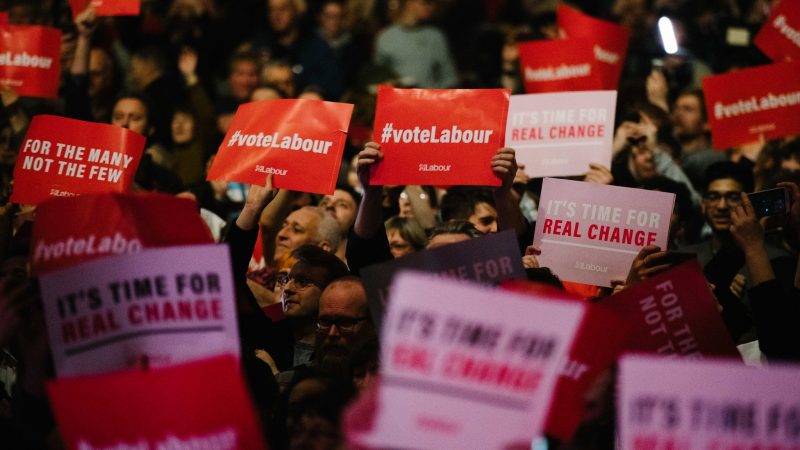
Since the announcement of the Centre Left Grassroots Alliance (CLGA) slate for the national executive committee (NEC) elections, the Labour left has been locked in an argument over unity, accountability and political red lines. The source of disagreement is over the inclusion of Laura Pidcock and Ann Henderson, both of whom have been questioned on their commitment to trans rights. The new Momentum national coordinating group (NCG) in particular has been called out for their support of the slate without further membership consultation. Promises of more open, democratic processes for internal decision-making were key demands of many of those now elected.
But Momentum isn’t the only body that faces criticisms. The Socialist Campaign Group (SCG) of Labour MPs also published a statement expressing their support for a “united left slate”. The origins of the SCG and the CLGA both represent a politics of defence against the institutional power of the right in Labour – the SCG split from the Tribune group of MPs in 1982 after its soft-left elements, led by Neil Kinnock, refused to back Tony Benn’s deputy leadership campaign. The CLGA was conceived in 1998 just after the Labour landslide, which tightened the grip of Blairism on the party. In those contexts, it made sense for the left to create these alliances. But do they still serve us in the current political moment?
The SCG represents the left in the Parliamentary Labour Party and therefore plays an important role in carrying the politics of the movement into the parliamentary realm. But the SCG’s organisation and decision making is not transparent and removed from accountability to the membership. In its current form, it can hardly fulfil this purpose. It is not clear what political principles form the basis of SCG membership, or to what extent MPs are expected to follow through practically on any of these principles in their work.
The CLGA negotiations have shown that abstract commitments to principles alone are clearly not sufficient. The majority of current NCG members signed the Labour Campaign for Trans Rights pledges during the NCG campaign. Momentum is nevertheless backing the ‘unity’ slate. A ‘united left’ is meaningless if we are not clear on what grounds we unite. Pledges become a hollow performance of virtue-signalling if upholding their principles can be negotiated away at a whim. Any alliance or broad coalition will lead to negotiations and compromise but it is at the moment impossible to tell on what basis these compromises are reached. Who determines that a ‘united’ slate trumps the defence of trans rights? What political principles are we willing to sacrifice on the altar of unity next?
Rather than arbitrary unity, the left should be willing and comfortable to agitate in these discussions. Transparency and accountability in decision making is not just a procedural fetish. Democracy in the party should not just become a buzzword to annoy moderates. The true democratisation of the movement means rejecting the oppressive structures of thought that bind us to political solutions that only serve to reinforce the dominant cultural and economic settlement.
If the movement is to become truly democratic we must push the boundaries of discourse in our own institutions. By defining our political lines, we can cohere what socialism means for us. It is an opportunity to challenge ourselves and our own perceptions of ‘what matters’ – and why. This, in particular in the context of liberation struggles, might lead to discomfort. But this discomfort is welcome and needed. Confronting our own discomfort is realising that we have been conditioned to reproduce oppression. The left must take this discomfort and turn it into a commitment to liberation – both by working to understand the existing structures in theory and then conveying this understanding in our political praxis. And this means uncompromisingly backing the struggles of oppressed minorities.
Socialists within Labour should not put factional alliance building and unity for internal elections before prospects of building a social movement coalition beyond it. The task of socialists is to organise and work towards building an alternative society that serves the people, not capital. This coalition has to unite left party activists with those currently on the ‘political outside’ – the working class and minorities who are not catered for by the existing parties. There is no point to winning positions in Labour if this means alienating the very groups of people we must work together with, and that also means rejecting patriarchal gender and family systems that uphold capitalism.
What was special about Jeremy Corbyn and John McDonnell was that they viewed themselves as accountable not just to the Labour Party or their constituencies. They were representatives of a wider social movement. The left now has to find ways to make our elected representatives accountable to the wider movement beyond the party as well. This could include mechanisms for those organising for liberation struggles outside Labour to be included in decision making in Momentum. This could help establish Momentum as an organisation that bridges between the organised left within Labour and social movements outside it. This could extend to the SCG too – it should not be a remote group of left MPs in parliament, deciding amongst themselves what their political strategy is. Through involvement in Momentum’s democratic processes, this could make the SCG directly accountable to the Labour left and social movements.
Socialists must remember that our goal is abolishing capitalism, and with it the political, economic and societal structures it produces and is reproduced by. Our strategic choices must be guided by this realisation. Focusing on winning internal positions in ways that risk alienating the coalitions we need to mobilise – those most oppressed by these structures, and with the most to gain from their abolition – are counterproductive and must be rejected.




More from LabourList
Tom Belger column: ‘Why is Labour making migrant exploitation easier?’
Ashley Dalton resigns as health minister for cancer treatment
Paul Nowak column: ‘Labour must focus on the basics’